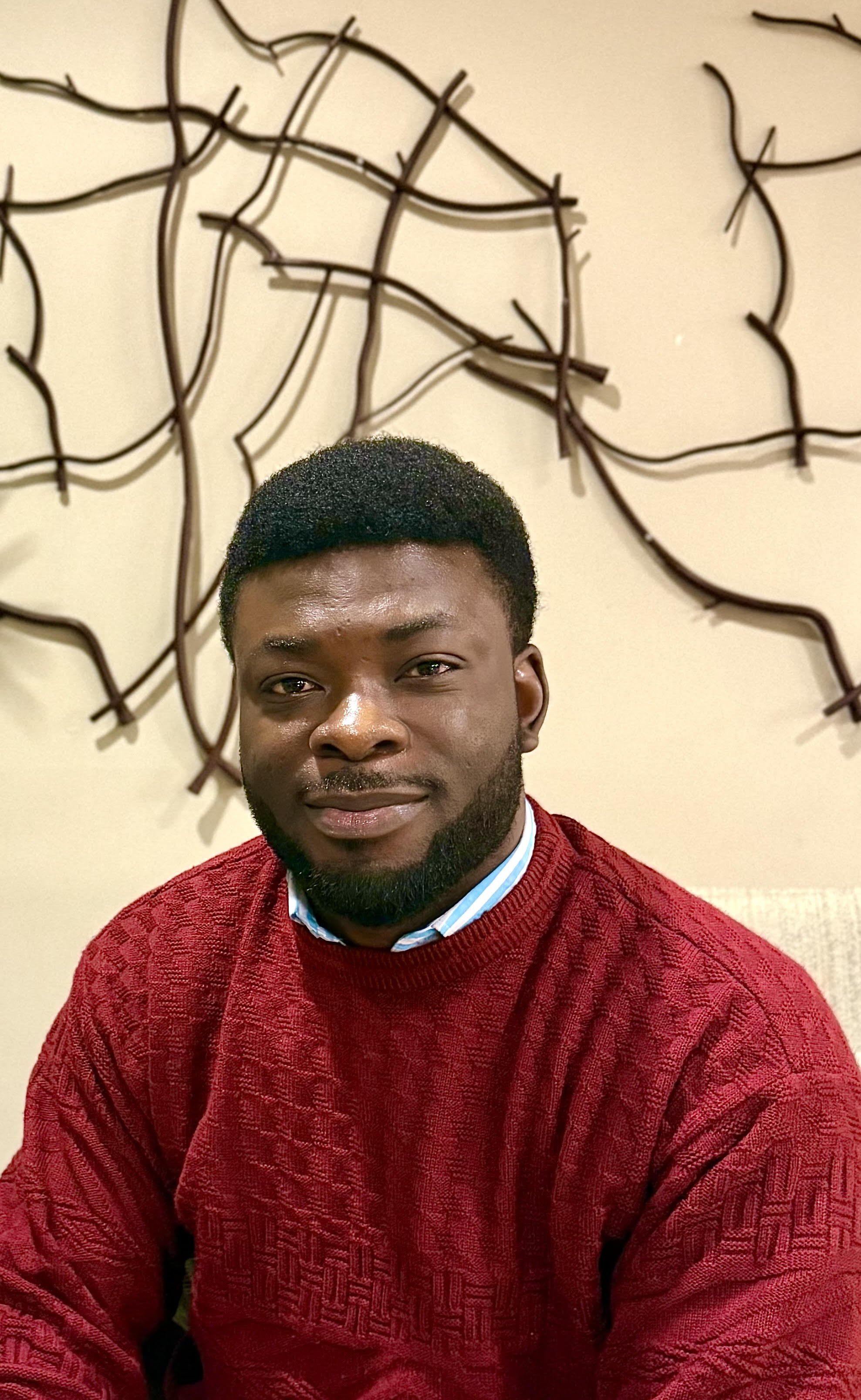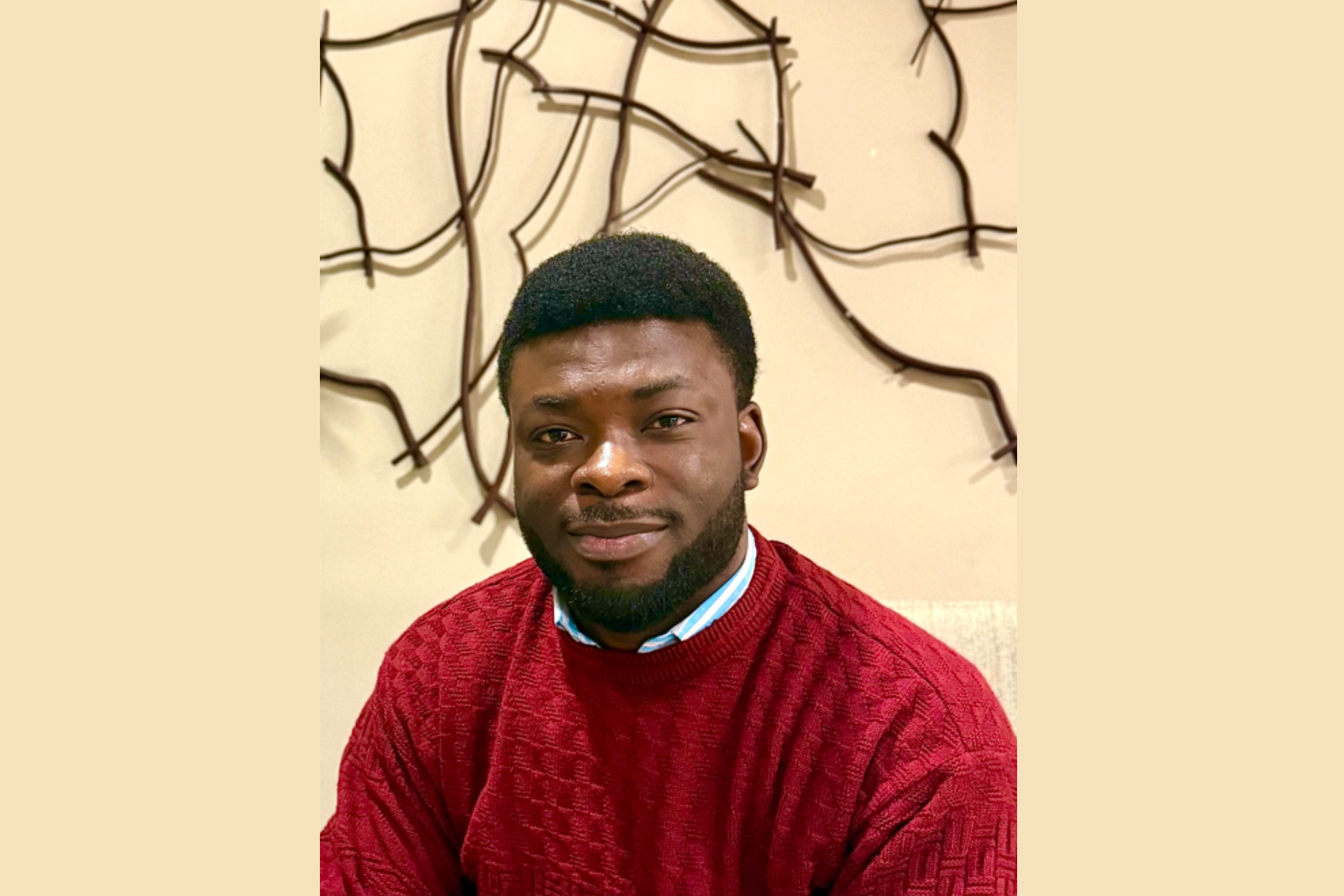Green Success Stories sat down with Champion Olatunji, sustainability consultant and co-founder of LiteOn. Champion discusses his sustainability journey, participating in cleanup efforts in his native Nigeria, and increasingly gaining understanding of the negative impacts on rural communities there as a result of oil exploration. He describes his deep experience, including vast and diverse work in sustainability, helping clients navigate complex regulatory landscapes, improve governance structures, and adopt sustainable practices that align with emerging global standards. Champion further describes the efforts of the startup he co-founded, LiteOn, that provides affordable and sustainable energy solutions for homes and businesses.

Tell us a bit about your sustainability journey.
I would say my sustainability journey started when I was much younger growing up in Nigeria. I grew up knowing and observing, like almost every other Nigerian, what is today called the federal “Environmental Sanitation” Program – a monthly environmental cleaning mandated by the government. At the time, these exercises felt like routine chores, but I surely enjoyed the time spent with members of my immediate community with the one goal of making our environment cleaner. That early connection played a vital role in helping me develop a unique perspective in college on the environment and environmental issues in Nigeria, so much so that I did a little research on the negative impacts of environmental degradation caused by International Oil Companies (IOCS) in rural communities in Nigeria as a result of oil exploration and similar activities.
During my time in college, I volunteered for IDEAS For Us, an accredited United Nations environmental non-profit organization with a presence at Obafemi Awolowo University. Collaborating with other students, I worked on initiatives that addressed environmental consciousness and sustainable practices among students at the university. This experience solidified my interest in ensuring businesses grow responsibly while protecting the planet and supporting people.
After graduation, I proceeded to the Nigerian federal government’s compulsory Youth Service Scheme which provided me with a plethora of opportunities to lead sensitization programs with other youths on environmental protection, drawing the attention of the state government to improper waste disposal that was prevalent in Plateau state at the time. Concurrently, I provided pro bono legal services to indigent citizens who could not afford legal representation, and as a result, could not afford bail. I worked towards securing their release and helping them reintegrate into their communities. These experiences allowed me to address both social and environmental challenges in a meaningful way.
The next phase of my professional career saw me join one of Nigeria’s largest law firms, where I advised clients on environmental law, energy, and corporate governance. While my work on corporate governance initially focused on regulatory compliance, I noticed a growing focus on environmental, social, and governance (ESG) principles among corporations. Initially, I viewed ESG as an extension of corporate social responsibility (CSR). However, as I worked on ESG-related challenges, I realized its distinct potential to drive meaningful change through accountability and regulatory compliance. My contributions included helping clients navigate complex regulatory landscapes, improve governance structures, and adopt sustainable practices that align with emerging global standards.
These experiences culminated in my decision to pursue a graduate degree at Duke University, where I deepened my knowledge at the intersection of business law, climate change, and financial markets. At Duke, I actively engaged in coursework on finance and market-based solutions to environmental challenges. I also co-led a seminar on voluntary carbon markets focusing on U.S., European, and African markets. The discussion highlighted the unique regulatory, market, and social dynamics shaping carbon trading systems across these regions, sparking engagement among my peers and professors’ discussions about the potential for harmonized global approaches to carbon markets.
Since graduating from Duke, I have transitioned into roles with U.S.-based organizations with brief stints at the Institute for Governance & Sustainable Development (IGSD) dedicated to advancing sustainability and clean energy development across various business lines. In these roles, I advised and consulted on tailored sustainability solutions designed to align with corporate objectives. My work has spanned key areas, including renewable energy, ESG, sustainable international trade, climate litigation and corporate governance. These efforts have helped national and sub-national governments, and businesses integrate sustainability into their operations while shaping academic discourse, as reflected in my publications in peer-reviewed journals.
Tell us a bit about the product or solution you offer.
I am a sustainability and clean energy consultant. My work focuses on clean energy development, Environmental, Social, and Governance (ESG) integration, and sustainable international trade where I design strategies that promote environmentally responsible trade practices. I advise on policies like carbon border adjustment mechanisms (CBAM), aligning trade policies with climate goals, and integrating sustainability principles into supply chain management. Another critical aspect of my work is contributing to research mitigating the dumping of inefficient cooling refrigerants in developing countries, which can harm the environment and local economies.
Further, given the evolving landscape of global sustainability regulations, I help companies remain competitive in a global market that increasingly prioritizes sustainability. This work is important for businesses operating across borders, as they face unique challenges in navigating complex regulatory landscapes and meeting diverse stakeholder expectations. By adopting sustainable trade practices, these businesses contribute to global climate goals, earn consumer trust, and mitigate risks associated with non-compliance.
Beyond consulting, I am the co-founder of Liteon, a startup providing affordable and sustainable energy solutions for homes and businesses. Liteon was conceived towards the end of my graduate program at Duke and has since achieved significant milestones in in developing a mid-fidelity prototype that has been successfully tested for real-world functionality, demonstrating its viability as a sustainable energy solution. We have participated in four accelerator programs across the U.S., including the Clean Tech Open Northeast Accelerator Program 2024, the largest clean technology accelerator in the world.
With the support of engineers at the Rev: Ithaca Lab at Cornell University, we have successfully built and tested our prototype with great reception and feedback from leading industry experts. Over the past year, we have connected with numerous investors and refined our go-to-market strategy that continues to prioritize even the most underserved populations in hard-to-reach communities that we aim to serve. We are now poised to deploy our solution to the market in 2025, offering innovative energy systems that reduce reliance on fossil fuels and empower communities with sustainable alternatives.
Liteon’s mission focuses on reducing reliance on fossil fuel generators by offering innovative solutions like lithium-ion battery-powered systems. Our approach is practical and impact-driven, leveraging global best practices to deliver clean, reliable energy alternatives that address environmental challenges and empower communities.
Share a green success story with us – how have you helped customers or other businesses in the fight against climate change?
In my role as fellow at IGSD, I was part of the team that led a project to curb the environmental and economic impact of inefficient refrigeration dumping in Africa. The finding of the project revealed that many developing countries have become dumping grounds for outdated and energy-inefficient cooling appliances from developed nations. Sadly, this practice as we know has increased greenhouse gas emissions due to high energy consumption, and posed economic challenges due to high operational costs for users. The challenge for this project was twofold – advocating for stronger regulations to prevent the importation of such harmful products and educating stakeholders on adopting sustainable alternatives. Collaborating with the team, through research, I worked on policy recommendations to align national trade policies with international environmental standards. Though still an ongoing effort, we have improved regulatory frameworks in targeted African regions, reducing the inflow of harmful refrigerants, with increased adoption of energy-efficient cooling systems among businesses.
What would you do with $1 billion dollars?
I have often imagined what I would do with significant figures if I had it. For a start, I would invest a significant portion into Liteon as we are still an early-stage startup – meeting with interesting investors and weighing up the best funding options available to us without losing our core values and objectives. Also as someone from Africa, who has seen and understands the importance of technological development to a developing community, I would set up a fund focused on technological infrastructures and work with local NGOs focused on eradicating world hunger.
What do you envision your industry looking like in ten years?
In ten years, I envision more globally coordinated efforts for sustainability literacy. Many people across the globe lack foundational knowledge about sustainability and climate science. For real and lasting progress, we must prioritize educating people – especially young people – about these topics and equip them with the tools to make a meaningful difference in their respective societies. Sustainability education must be engaging, accessible, and actionable to have a widespread and lasting impact.
Further, I see significant strides in bridging energy equity, security, and affordability. These efforts are crucial if societies worldwide are to manage decarbonization and resilience with justice at the center. Addressing these challenges ensures that the energy transition is inclusive and benefits all communities equitably. Some solutions already exist in the market in response to recent energy shocks, while others will be developed or redesigned to address current gaps and anticipate future needs. These innovations will play a pivotal role in completing the transition to a fully decarbonized and resilient global economy.
What would you like readers to take away from this article?
Many great opportunities come disguised as problems that appear impossible to solve, such as the current need to keep the 1.5°C temperature target within reach. I want readers to understand that humanity and nature are inseparable, so the solutions or investment models being developed or designed by financial actors, businesses, governments, and consumers to solve the current sustainability and energy challenges must be transparent, just, and human-centered. We all have a role in shaping a greener, more equitable future, and I hope this article inspires readers to be part of the solution.
How should readers get in touch with you and/or your organization?
They can reach out to me at champion.olatunji @ liteon.app.
Kudos
Many thanks to Champion Olatunji and LiteOn. Green Success Stories is happy to support and highlight your efforts! We invite you the reader to do the same.
About Green Success Stories
Green Success Stories is a media platform that highlights leaders in sustainability and climate tech.
We offer professional writing (articles, blogposts, case studies, and more) combined with social media promotion. You get great content + exponential publicity. As a starting offer, we’d like to feature you and your organization in a FREE PROFILE ARTICLE. There’s no obligation, but we’d appreciate you considering our services. Let us know if you’re interested and we’ll share more information.
Support Green Success Stories
Like what we’re doing? Please pitch in and help us highlight leaders in the fight against global warming.
